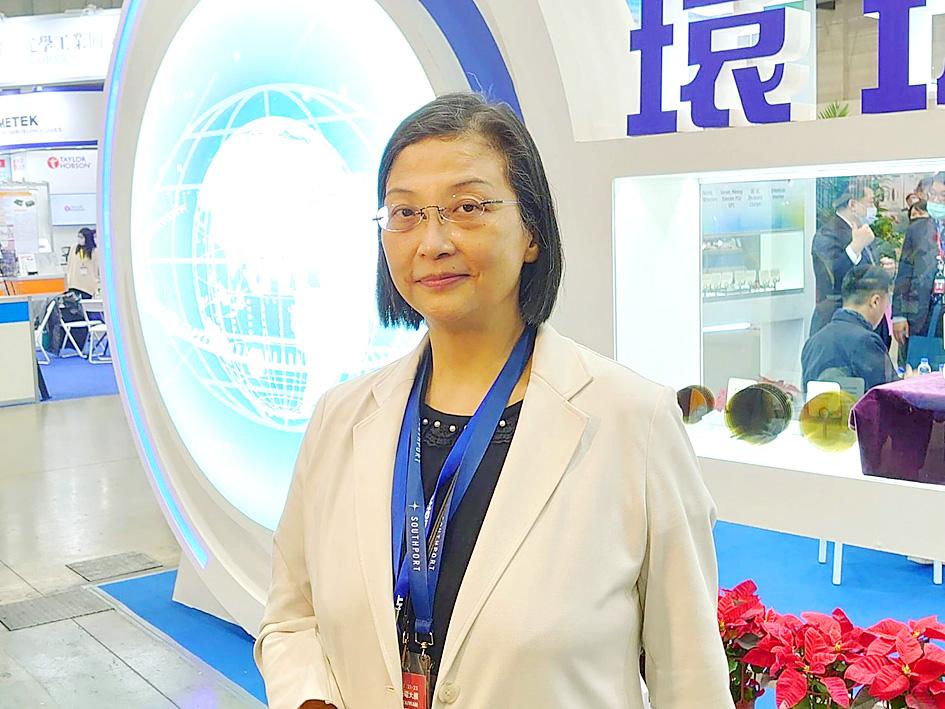GlobalWafers Co (環球晶圓), the world’s third-largest silicon wafer maker, yesterday said that Samsung Electronics Co and most of its customers have not scaled back on orders, or delayed shipments, even though consumer spending has shifted away from smartphones and notebook computers due to mounting inflation pressures.
Rising inflation has altered consumers’ spending habits, dampening sales of consumer electronics, the Hsinchu-based company said.
However, customers all honored their supply agreements by adjusting their product mix and shifting to applications that are still reporting robust growth, it said.

Photo: CNA
Aside from one 6-inch factory, GlobalWafers’ 15 factories around the world are running at 100 percent utilization, the company said, adding that they would continue running at full capacity until the end of this year, thanks to increasing demand.
“Up to now, we did not feel the squeeze from Samsung. We do not see any impact on wafer [supply] at all,” GlobalWafers chairwoman Doris Hsu (徐秀蘭) told a virtual media briefing after the company’s annual shareholders’ meeting in Hsinchu.
“Most customers who ordered 8-inch and 12-inch wafers do not intend to cut the amount, or delay shipments, even though some customers are seeing slow demand for display driver ICs. They have just altered their product mix to cope with it,” Hsu said.
GlobalWafers has continued to sign new long-term agreements (LTAs) for supply — some lasting until 2031 and most exceeding 2028, Hsu said.
The company is still in talks to sign contracts primarily for the supply of 12-inch wafers, as well as 8-inch float zone wafers with high-purity silicon, she said.
“Demand is still on the rise. Customers have expressed a strong willingness to sign new LTAs,” Hsu said.
Based on a new agreement with its customers, GlobalWafers expects its wafer average selling prices to continue to increase this year and next year, she said.
LTAs guarantee fixed wafer supply at fixed prices.
Asked if GlobalWafers would consider suspending its plan to construct a new factory amid rising oversupply concerns, Hsu said that the industry’s short-term ups and downs would not affect the company’s capacity expansion plans.
“Semiconductor demand will be back on the growth track in the long term. This is not going to change,” she said, adding that 5G-related devices, artificial intelligence, autonomous vehicles and emerging technologies would drive demand.
GlobalWafers plans to announce the location of a new fab by the end of this month, Hsu said.
The firm has removed Japan, where it already has five factories, and Southeast Asian nations, including Singapore, from its short list.
GlobalWafers in February unveiled a series of greenfield and brownfield capacity investment plans worth NT$100 billion (US$3.37 billion) in total.
The company’s shareholders yesterday approved a plan to distribute a cash dividend of NT$16 per common share. That represented a payout ratio of 58.67 percent based on the company’s earnings per share of NT$27.27.

Taiwan Transport and Storage Corp (TTS, 台灣通運倉儲) yesterday unveiled its first electric tractor unit — manufactured by Volvo Trucks — in a ceremony in Taipei, and said the unit would soon be used to transport cement produced by Taiwan Cement Corp (TCC, 台灣水泥). Both TTS and TCC belong to TCC International Holdings Ltd (台泥國際集團). With the electric tractor unit, the Taipei-based cement firm would become the first in Taiwan to use electric vehicles to transport construction materials. TTS chairman Koo Kung-yi (辜公怡), Volvo Trucks vice president of sales and marketing Johan Selven, TCC president Roman Cheng (程耀輝) and Taikoo Motors Group

Among the rows of vibrators, rubber torsos and leather harnesses at a Chinese sex toys exhibition in Shanghai this weekend, the beginnings of an artificial intelligence (AI)-driven shift in the industry quietly pulsed. China manufactures about 70 percent of the world’s sex toys, most of it the “hardware” on display at the fair — whether that be technicolor tentacled dildos or hyper-realistic personalized silicone dolls. Yet smart toys have been rising in popularity for some time. Many major European and US brands already offer tech-enhanced products that can enable long-distance love, monitor well-being and even bring people one step closer to

RECORD-BREAKING: TSMC’s net profit last quarter beat market expectations by expanding 8.9% and it was the best first-quarter profit in the chipmaker’s history Taiwan Semiconductor Manufacturing Co (TSMC, 台積電), which counts Nvidia Corp as a key customer, yesterday said that artificial intelligence (AI) server chip revenue is set to more than double this year from last year amid rising demand. The chipmaker expects the growth momentum to continue in the next five years with an annual compound growth rate of 50 percent, TSMC chief executive officer C.C. Wei (魏哲家) told investors yesterday. By 2028, AI chips’ contribution to revenue would climb to about 20 percent from a percentage in the low teens, Wei said. “Almost all the AI innovators are working with TSMC to address the

Malaysia’s leader yesterday announced plans to build a massive semiconductor design park, aiming to boost the Southeast Asian nation’s role in the global chip industry. A prominent player in the semiconductor industry for decades, Malaysia accounts for an estimated 13 percent of global back-end manufacturing, according to German tech giant Bosch. Now it wants to go beyond production and emerge as a chip design powerhouse too, Malaysian Prime Minister Anwar Ibrahim said. “I am pleased to announce the largest IC (integrated circuit) Design Park in Southeast Asia, that will house world-class anchor tenants and collaborate with global companies such as Arm [Holdings PLC],”